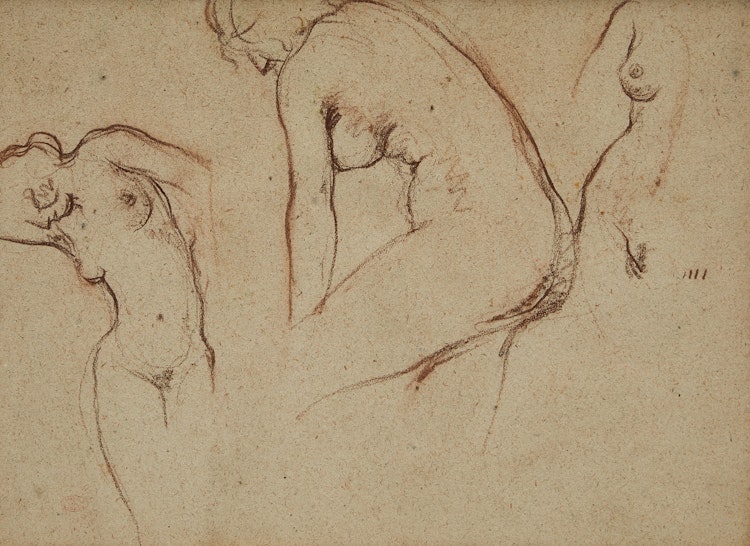Sketchbook Group by Clarence Alphonse Gagnon

Clarence Gagnon
Sketchbook Group
pencil
titled on a label on the reverse
9.75 x 13 ins ( 24.8 x 33 cms ) ( sight )
Auction Estimate: $700.00 - $900.00
Price Realized $780.00
Sale date: May 30th 2023
Walter Klinkhoff Gallery, Montreal
Private Collection, Toronto
Share this item with your friends
Clarence Alphonse Gagnon
(1881 - 1942) RCA
Clarence Gagnon was born in Montreal, Quebec, his father of French origin and his mother of English. The Gagnon family moved to St. Rose where they lived for ten years, then returned to Montreal where Clarence received a commercial education at the Ecole du Plateau and artistic training at the Art Association of Montreal under William Brymner from 1897-1900. In the summer of 1899 he spent some time in Lower Quebec where he did paintings that won him prize money from the Art Association of Montreal. After two years at the Association he worked for William Maxwell, R.C.A., prominent architect and spent his summers at St. Joachim. At Maxwell’s home in 1902, Gagnon made his first drypoint etching no bigger than a visting card. Gagnon probably studied the engravings of Rembrandt as he once told Robert Pilot about the time he and another artist secured the loan of six small etched copper plates by the Dutch master with which they made several copies of each.
In 1903, the generosity of art patron James Morgan allowed him to go to Paris and study in the studio of painter Jean-Paul Laurens. Gagnon distinguished himself early in his career by the quality of his engravings and won a gold medal at the St. Louis Exhibition in 1904 and an honourable mention the following year at the Salon des Artistes Francais in Paris. Two of his etchings were reproduced in Paul Duval’s book “Canadian Drawings and Prints”. Many of these etchings were of scenes in Venice, Normandy and Brittany.
Returning to Canada in 1909, he divided his time between Montreal and Baie-St-Paul. There in Charlevoix County, he painted scenes of habitant life and was soon a familiar figure in the community. He had a genuine love of the country and could detect the slightest change in some areas where he spent many hours. He became a member of the Royal Society of Canada and later he was elected associate of the Royal Canadian Academy of Arts.
He felt compelled to return to France in 1917 and, while in Paris, continued to paint canvases based on his earlier sketches of Quebec villages. His occasional winter visits to Norway refreshed his memories of snow and the northern atmosphere. He returned to Canada to marry two years later, remaining until 1924. During this period, he sketched with A.Y. Jackson and Edwin Holgate at Baie Ste Paul. He received the Trevor Prize of the Salmagundi Club of New York. He illustrated “Le Grand Silence Blanc” (1929) and the deluxe edition of Louis Hemon's “Maria Chapdelaine” (1933). Upon his return from a second stay in France from 1922-36, the University de Montreal awarded him an honorary doctorate.
He died in Montreal at the age of 61. A memorial exhibition of his work was organized by the National Gallery of Canada which included paintings from the permanent collections of the National Gallery and the Art Gallery of Ontario.
Sources: "A Dictionary of Canadian Artists, Volume I", compiled by Colin S. MacDonald, Canadian Paperbacks Publishing Ltd, Ottawa, 1977

